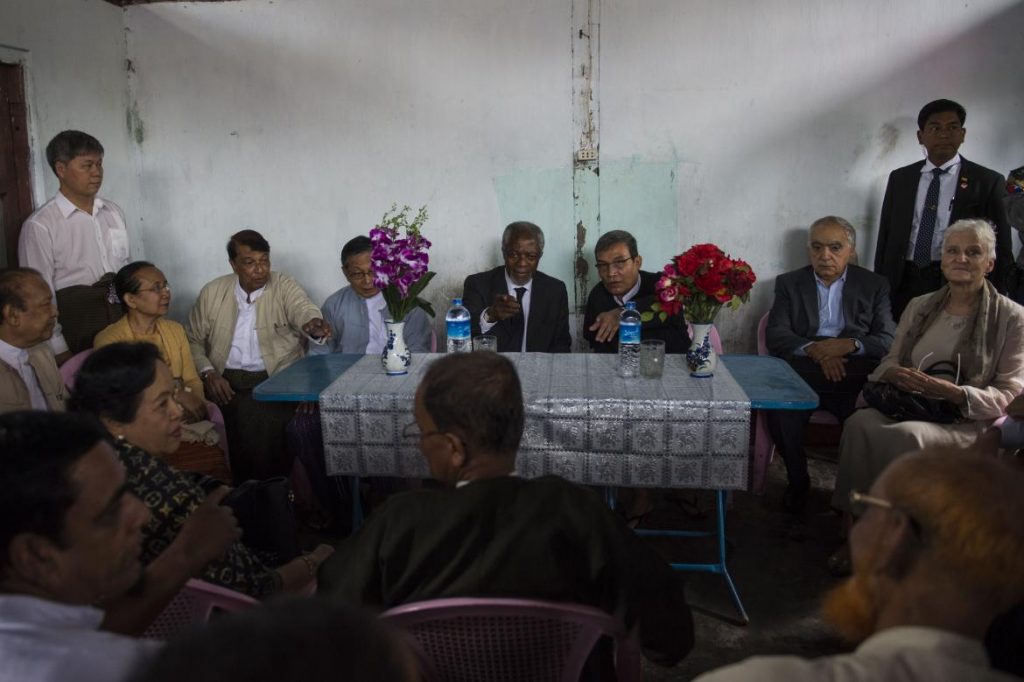If new initiatives are simply dismissed out of hand, without allowing time to see whether they can be effective, it will be difficult to find a way forward.
FORMER UNITED Nations Secretary-General Kofi Annan came to Myanmar this month in the first of a series of visits as part of his role as head of the newly established advisory commission on Rakhine State.
The nine-member commission, which will include six Myanmar and three international advisers, including Annan, has been established to recommend conflict-prevention measures, humanitarian assistance mechanisms and long-term development plans. It will submit a report to the government that will be released publicly within one year.
The commission was established by State Counsellor Daw Aung San Suu Kyi. Speaking alongside Annan at a Yangon press conference on September 5, she admitted that Myanmar had not done enough to find solutions to the conflict in the restive state.
But before Annan’s feet had even touched the ground in Myanmar, complaints had begun rolling in. Within Myanmar, groups including the Arakan National Party and the Union Solidarity and Development Party – the latter seeking a path out of irrelevance following its embarrassing election loss last year – were criticising the foreign membership of the commission, arguing that the issue should be dealt with internally.
U Tun Aung Kyaw, secretary of the ANP, has said that, if invited, party representatives would not meet with the commission, according to a report in the Myanmar Times. The report added that a proposal to remove the three foreigners from the commission was due to be discussed in parliament on September 5. But with Annan already in Myanmar and beginning his work, the proposal was destined to fail.
Support more independent journalism like this. Sign up to be a Frontier member.
On the other side is criticism, mainly in the international community, that Aung San Suu Kyi has formed the committee to get the critics off her back. Those concerns were heightened by the lack of any commission members who self-identify as Rohingya.
This is a common refrain. Since violence erupted in the state in 2012, the National League for Democracy leader has been criticised for her perceived inaction on issues facing the state, particularly the statelessness of its Muslim population.
But in this case, the criticism seems misplaced. Annan was head of the UN for two terms. Despite a number of criticisms of the UN system – sometimes justified – he is regarded as one of the world’s leading diplomats. If Aung San Suu Kyi wanted a whitewash – and there’s no indication that she does – she would have brought in someone of lower profile to do her bidding, rather than a person of Annan’s stature.
The current government, under the leadership of Aung San Suu Kyi, does not benefit from lingering conflict in Rakhine. It is a massive challenge that sucks up resources and attention from the rest of the country’s challenges. Until progress is made – on the hundreds of thousands who have no freedom of movement, the crushing poverty, the sense of insecurity and hostility – the state will continue to hold back the rest of the country.
The military government may have done little for development there, but it is this publication’s view that the NLD-led government is genuine in its desire to move forward. The complex dynamics and deep-rooted tension means that success will come slowly.
The commission is designed to support that process. It does not have the power to solve problems on its own. However, its actions should still be scrutinised. It needs to listen to all voices, particularly those at the heart of the conflict, and ensure all actors in Rakhine State have the chance to put forward their views and suggestions. This broad consultation is precisely what has been missing from the debate until now.
The commission also should not serve to distract the role that other actors, including the government, are playing in Rakhine State. Recently, there has been some progress. An estimated 20,000 internally displaced people have returned to their homes in the past year, but huge obstacles remain.
In these pages, we have been critical of the government when we believe it to be necessary. If Myanmar wants to be regarded as a democratic country then constant questioning of its government’s policies and decisions should be encouraged. But we have always tried to ensure that our questions and criticisms are constructive.
We do not know yet what impact, if any, this commission will have, but if new initiatives are simply dismissed out of hand, without allowing time to see whether they can be effective, it will be difficult to find a way forward.
A version of this editorial originally appeared in the September 8 edition of Frontier.







